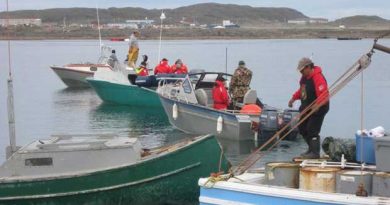Company aims to give the Arctic ‘fibre-like’ internet through satellites

A UK-based telecommunications company is planning to launch hundreds of satellites in an effort to provide worldwide broadband internet service, and Arctic communities will be some of the first to benefit.
OneWeb already launched some satellites in February, and a representative for the company said they are performing better than expected. The ultimate goal is to create a satellite constellation that will be fully operational starting in 2021.
“It’s not … the satellite communications that some people are used to where there was a delay when you were talking on the phone or you hit ‘enter’ on a link and waited for the page to load,” said Diego Paldao, director of OneWeb for the Americas.
“We’re talking about fibre-like experience … That’s going to be sort of revolutionary for folks.”

OneWeb already has a connection to the Canadian Arctic through satellite dishes at the Canadian Satellite Ground Station in Inuvik, in the Northwest Territories.
Many communities in the Arctic have slow and costly internet. Although the Mackenzie Valley Fibre link has brought faster and more reliable internet from Fort Simpson to Inuvik, other places in the N.W.T. stand to benefit “substantially” from this service, according to Tom Zubko, president of New North Networks, which manages Inuvik’s satellite station.
He named places like Sachs Harbour and Ulukhaktok, north of the Arctic Circle, as examples.
“It really is going to change connectivity across North and you know across the world really in so many ways,” he said.
Paldao said historically, the Arctic has been “at the mercy of whatever [internet] they could get.” Now, he says, because OneWeb’s constellation involves polar orbiting satellites, his company’s technology will be available in Arctic communities first.

The goal is to launch an internet service across the circumpolar North, including Nunavut, Yukon and the Northwest Territories, by the end of 2020.
He said schools are a huge priority for the company, and he wants to make it easier for students to have access to resources like E-learning.
OneWeb plans to launch 30 to 36 more satellites to its current constellation in December.
Related stories from around the North:
Canada: Telecom outages cost Yellowknife economy $10M, chamber says, CBC News
Finland: Major step towards a Europe-Asia Arctic cable link, Yle News
Norway: New satellites to boost communications in Arctic Norway, The Independent Barents Observer
Russia: Russian military to get fast, secure internet through trans-Arctic cable, The Independent Barents Observer
Sweden: Northern Sweden to host more Facebook servers, Radio Sweden
United States: Alaska’s first wireless 5G network to be built in Anchorage, Alaska Public Media



